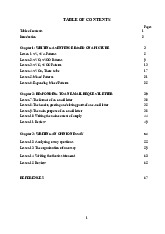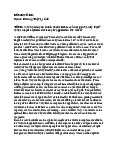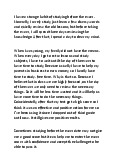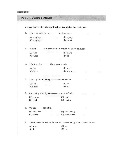



















Preview text:
WRITING 1
TRƯỜNG ĐẠI HỌC DUY TÂN KHOA NGOẠI NGỮ
BỘ MÔN: ANH VĂN KHÔNG CHUYÊN GIÁO TRÌNH VIẾT 1 WRITING 1 LƯU HÀNH NỘI BỘ TABLE OF CONTENTS Pages Table of contents 1 Introduction 2
Chapter 1: WRITING A SENTENCE BASED ON A PICTURE 3 Lesson 1: SV, SVA Patterns 5 Lesson 2: SVO, SVOO Patterns 9 Lesson 3: SVC, SVOC Patterns 13 Lesson 4: SVOA, There to be 17 Lesson 5: Mixed Patterns 21
Lesson 6: Expanding Mixed Patterns 25
Chapter 2: RESPONDING TO AN E-MAIL REQUEST LETTER 29
Lesson 7: The format of an e-mail letter 30
Lesson 8: The header, greeting and closing parts of an e-mail letter 35
Lesson 9: The main purpose of an e-mail letter 38
Lesson 10: Writing the main content of a reply 44 Lesson 11: Review 49
Chapter 3: WRITING AN OPINION ESSAY 54
Lesson 12: Analyzing essay questions 55
Lesson 13: The organization of an essay 59
Lesson 14: Writing the thesis statement 63 Lesson 15: Review 65 REFERENCES 67 2
INTRODUCTION TO TOEIC 4 SKILLS TEST
The Test of English for International Communication, TOEIC®, is a standard and objective
assessment for English language proficiency in the workplace. The TOEIC® is the most used test
for Business English with more than 7 million worldwide test-takers each year. The TOEIC® is
recognized as proof of a person’s English language competence by businesses, universities,
technical colleges and business schools, when considering potential candidates for admission to
their organizations. In countries such as the United Kingdom, the TOEIC® is a requirement for Visa
applications. The TOEIC® 4 Skills test offers a common standard of measurement for listening,
reading, writing, and speaking skills. Test Format
• Non-incremental placement test (no pass-or-fail system)
• Paper and pencil (Listening & Reading)
• Online test (Speaking &Writing)
• Administered in authorized TOEIC® test centers
• Individual test sittings available by appointment Language Level
A1-C1 in accordance with the Common European Frame of Reference Usage
Evaluation and certification of English language skills are used at a specific point in time for
students, graduates, employees, job applicants and professionals, who may require evidence of their
language skills for their studies or jobs. The test can also be used as an aid to monitor the learning
progress of individual’s participating in language training programs. Structure
Listening: 100 multiple choice questions in 45 min.
Reading: 100 multiple choice questions in 75 min.
Speaking: 11 tasks (6 types of questions) in 20 min.
Writing: 8 tasks (3 types of questions) in 60 min. Test Length
200 min. test duration plus a break of 30 min. between Listening & Reading, Speaking & Writing Results
• Score reports for Listening & Reading and Speaking & Writing
• Individual analysis of strengths and weaknesses
• Correlation table with CEFR* mapping and Can-Do-Statements
• Certificate for all four skills (optional) 3
• Score evaluation within 15 business days, excl. postal time TOEIC Writing
The optional Speaking and Writing test was introduced in 2006. More and more people in business
connect globally through video conferencing, web conferencing, Skype and e-mail. If you're going
to be successful in a global company, you have to be able to speak fluently and write well in English.
The type and format of the questions in the optional Speaking and Writing test are quite different
compared to the standard TOEIC .
test However, similar skills are being tested as well as your
ability to communicate effectively. As with the standard test, all the questions are designed to
represent real world corporate situations from the factory level all the way up to the boardroom.
Your ability to communicate in any kind of workplace situation is being evaluated. However, you
do not have to have specialized business knowledge to be able to answer the writing or speaking tasks. Unlike the and Listening
Reading sections of the standard TOEIC test, the optional Speaking and
Writing test is done at a computer. Your responses are sent directly to ETS's online scoring network
where highly trained graders by ETS will mark your responses. For Writing, the range of scores
varies for each of the 3 types of tasks: 0-3 for tasks 1-5, 0-4 for tasks 6-7 and 0-5 for task 8. The
sum of your scores for the 8 writing tasks is then scaled. The scaled score range is 0-200. In
addition to your scaled score, you are assigned a proficiency level. There are 9 for writing. To see
what the 9 levels are as well as description of what each means in terms of your writing skills.
What score you get for your writing responses is based on how well you demonstrate these essential
skills: sentence variety, grammar, range and appropriateness of vocabulary, and coherence and
organization. Sentence variety means you use more than one kind of sentence structure. Grammar
covers many, many skills. Make sure to read over your responses for spelling mistakes! Range and
appropriateness of vocabulary means you don't use the same words over and over again, as well as
using the right words related to the topic. What you write should make sense, someone reading it
should not be confused or have a hard time understanding what you're trying to convey. Going from
one idea to another should progress in a logical manner. This is what coherence and organization refer to.
The Writing section has 8 tasks. You have a total time of 1 hour to complete them all. These are the
3 types of TOEIC Writing tasks in the order in which you will do them in the test: W
rite a sentence based on a picture : 5 questions Respond to a written request : 2 questions Opinion essay : 1 question 4 CHAPTER 1 WRITING SENTENCES Lesson 1: SV, SVA Patterns Lesson 2: SVO, SVOO Patterns Lesson 3: SVC, SVOC Patterns Lesson 4: SVOA, There to be Lesson 5: Mixed Patterns
Lesson 6: Expanding Mixed Patterns 5
LESSON 1: SV, SVA PATTERNS A-LANGUAGE FOCUS I- Basic clause elements S V: Subject + Verb -He is sleeping. -The baby is crying.
SVA: Subject + Verb + Adverbial phrase
-The man is in the kitchen.
-The actor is appearing on the stage. -He is going to the theatre. II-Expanding clauses SV(A), SVA(A)
-He / is sleeping / in the garden (place) S V A (place)
-He is sleeping in the morning (time) -He is sleeping well (manner)
-He is writing with a pen (manner)
TEST TIP: Use modifiers appropriately
One of the words may be a modifier. These are adjectives and adverbs or adverbial phrases which
give more information about the subject/or verbs. Understanding how to identify them, and position
in a sentence will help you make well-formed sentences. B-LANGUAGE PRACTICE
I-Underline and name the clause elements
1. The lion /is roaring /loudly. S V A (manner)
2. The boy/ is lying /on the ground.
3. The tall man /is standing /behind the tree.
4. The man /is talking/ on the telephone.
5. The meeting/ is happening /in the afternoon.
II-Make a sentence with the given words: 1. man/ room/ alone 2. plant/ table
3. festival/ occur/ Danang city 4. animals/ run/ away
5. passengers/ wait/ line/ shop C-PRACTICE IN TOEIC I. Building Language Picture 1 Picture 2 6
a- Give some nouns and verbs which may be used to describe pictures 1 and 2. Compare with your friends.
b- Complete the following about picture 1 and 2 sentences with the given words:
alone - sitting - the phone - next to – in front of
1. The man is in the room………………..
2. The man is talking on……………….....
3. The man is …………………. on a desk
4. The chefs are ......................... each other.
5. The desserts are ……………….the chefs. II. Tactic Practice
Make sentences about the pictures with the suggested words Picture 1: meeting/ go/ well
Picture 2: ship/ be/ port
……………………………………….. ……………………………………………
……………………………………….. ……………………………………………
……………………………………….. ……………………………………………
Picture 3: workers / be/ ground
Picture 4: city/ run/ coast
………………… …………………….. ……………………………………………
……………………………………….. ……………………………………………
………………………………………… ……………………………………………
III. Test Practice (homework)
In this part of the test, you will write ONE sentence that is based on a picture. With each
picture, you will be given two words or phrases that you must use in your sentence. You can change
the forms of the words and you can use the words in any order. 7
TEST TIP: Think about the subject
The subject of the sentence may be people or things. Given nouns will always be singular, so you
may have to change them to the plural form. Your sentence could also be about location of certain
objects in the picture, e.g. There are two pens on the desk. 1. boat / sail
Subject: ………………………….
Verb:……………………………..
Adverbial phrase:…………………
Preposition: ………………………
Other modifiers………………… Sentence:
…………………………………..
…………………………………..
…….............................................. 2. passengers / train
Subject: ………………………….
Verb:……………………………..
Adverbial phrase:…………………
Preposition: ………………………
Other modifiers………………… Sentence:
…………………………………..
…………………………………..
…………………………………. 3. cars/ bridge
Subject: ………………………….
Verb:……………………………..
Adverbial phrase:…………………
Preposition: ………………………
Other modifiers………………… Sentence:
…………………………………..
…………………………………..
………………………………….. 8 4. Stand / line
Subject: ………………………….
Verb:……………………………..
Adverbial phrase:…………………
Preposition: ………………………
Other modifiers………………….. Sentence:
…………………………………..
…………………………………..
…………………........................... 5. boat/ dock
Subject: ………………………….
Verb:……………………………..
Adverbial phrase:…………………
Preposition: ………………………
Other modifiers………………… Sentence:
…………………………………..
…………………………………..
…………………………………..
---------------------------------------------------- Lesson: 2 SVO, SVOO I-Basic clause elements
S VO: Subject + Verb + Object -He is writing a letter
-The baby is drinking a cup of milk
SVOO: Subject + Verb + Object + Object
-The man/ is passing/ a box / to the woman S V O O
-He sent a letter to his father 9 Notes:
SVOdOi: S + V + Odirect + preposition + Oindirect
-He sent a letter to his father
SVOiOd: S + V + Oindirect + Odirect -He sent his father a letter II-Expanding clauses SVO(A), SVOO(A)
-He/ is writing/ a letter/ (place) in the library SVO(A)
-He sends a letter to his father every week. (time) SVOOA -He can run (manner)SV very quickly A
-The man is using a machine to make a key ( purpose) A (purpose)
TEST TIP: Use modifiers appropriately
One of the words may be a modifier. These are adjectives and adverbs or adverbial phrases which
give more information about the subject/object or verbs. Understanding how to identify them, and
position in a sentence will help you make well-formed sentences. B-LANGUAGE PRACTICE
I-Underline and name the clause elements
1. The cat is catching a mouse
2. The boy students send flowers to the girl friends on 8th March. SVOOA
3. The tall man is eating a big cake in the kitchen. SVOA
4. The man is carrying a case. SVO
5. The lorry is passing the road. SVO
II-Make a sentence with the given words:
1. porter/ suitcases/ second floor 2. waiter/ table/ carefully
3. engineers/ buildings/ the beach 4. buy/ a gift/ sweetheart
5. train/ passengers/ Hanoi station take….. to C-PRACTICE IN TOEIC I. Building Language
a-Give some nouns and verbs which may be used to describe pictures 1 and 2. Compare with your friends.
b-Complete the following about picture 1 and 2 sentences:
1. The man is holding a….……
2. The man is …………….a red apron
3. The woman is …………………. man his ticket.
4. The woman is ......................... at the man.
5. The man and woman are at the………….. Picture 1 Picture 2 10 II. Tactic Practice
Make sentences about the pictures with the suggested words
Picture 1: person/ money /ATM withdraw (v) Picture 2: man /arrange / warehouse
……………………………………….. ……………………………………………
……………………………………….. ……………………………………………
……………………………………….. ……………………………………………
Picture 3: engineers/ discuss/ plans
Picture 4: guard/ search/ man
……………………………………….. ……………………………………………
……………………………………….. ……………………………………………
………………………………………… ……………………………………………
III. Test Practice (HOMEWORK)
In this part of the test, you will write ONE sentence that is based on a picture. With each
picture, you will be given two words or phrases that you must use in your sentence. You can change
the forms of the words and you can use the words in any order.
TEST TIP: Think about the subject
The subject of the sentence may be people or things. Given nouns will always be singular, so you
may have to change them to the plural form. Your sentence could also be about location of certain
objects in the picture, e.g. There are two pens on the desk. 11 1. snow / away
Subject: ………………………….
Verb:……………………………..
Object:…………………………..
Adverbial phrase:…………………
Preposition: ………………………
Other modifiers………………… Sentence:
…………………………………..
………………………………….. 2. children/ hands
Subject: ………………………….
Verb:……………………………..
Object:…………………………..
Adverbial phrase:…………………
Preposition: ………………………
Other modifiers………………… Sentence:
…………………………………..
………………………………….. 3. tie/ post
Subject: ………………………….
Verb:……………………………..
Object:……………………………
Adverbial phrase:…………………
Preposition: ………………………
Other modifiers………………… Sentence:
…………………………………..
………………………………….. 4. check/ data
Subject: ………………………….
Verb:……………………………..
Object:…………………………..
Adverbial phrase:…………………
Preposition: ………………………
Other modifiers………………….. 12 Sentence:
…………………………………..
………………………………….. 5. woman/ notebook
Subject: ………………………….
Verb:……………………………..
Object:…………………………..
Adverbial phrase:…………………
Preposition: ………………………
Other modifiers………………… Sentence:
…………………………………..
…………………………………..
----------------------------------------------------- 13
LESSON 3: SVC, SVOC PATTERNS A-LANGUAGE FOCUS I-Basic clause elements
S VC: Subject + Verb + Complement -She is beautiful. (adjective)
-The cake tastes sweet (adjective) -The boy is a clever student (noun)
Notes: The Complement Subject
In this clause pattern the element that comes after the verb provides more information about the
subject; it serves to complete the subject, so it is called the complement, or more fully, the subject complement.
SVOC: Subject + Verb + Object + Complement -They are keeping
the hands warm (adjective) SVOC
-The son have the car cleaned (participle) SVOC
-We call him ‘Father’ (noun) SVOC
Notes: The Complement Object
In this clause pattern the element that comes after the
object provides more information about the
object; it serves to complete the object, so it is called the complement, or more fully, the object complement. II-Expanding clauses SVC(A), SVOC(A)
-He/ is /a teacher /at DTU (place) SVCA
-He /is keeping /the baby /warm /in the winter morning (time)SVOCA
-She /is/ very beautiful (degree)SVC
TEST TIP: Use modifiers appropriately
One of the words may be a modifier. These are adjectives and adverbs or adverbial phrases which
give more information about the subject/or verbs. Understanding how to identify them, and position
in a sentence will help you make well-formed sentences. B-LANGUAGE PRACTICE
I-Underline and name the clause elements 1. The woman appears lonely 2. The boy keep the dog warm
3. Most college freshmen call themselves serious teachers
4. The freshmen described themselves as "conservative" 5. The cake tastes sweet
II-Translate into English: (HOMEWORK)
1. Các chàng trai đó trở thành những cầu thủ bóng đá nổi tiếng
2. Họ trông có vẻ kiệt sức
3. Chúng tôi để cửa sổ mở
4. Họ bầu John làm lớp trưởng
5. Chúng tôi đặt tên nó là Mimosa C-PRACTICE IN TOEIC I. Building Language 14
a-Give some nouns and verbs which may be used to describe pictures 1 and 2. Compare with your friends.
b-Complete the following about picture 1 and 2 sentences:
1. The class………………..exciting. (picture 1)
2. The children seem……………….....
3. The teacher looks ……………………
4. The woman is holding the ........
................. open. (picture 2) door
5. The door has not been ……………….yet. Picture 1: Picture 2: II. Tactic Practice
Make sentences about the pictures with the suggested words Picture 1: traffic/ be/ busy
Picture 2: woman/be /attentive
……………………………………….. ……………………………………………
……………………………………….. ……………………………………………
……………………………………….. ……………………………………………
Picture 3: man/ hold/ open
Picture 4: people/ seem/ tired
……………………………………….. ……………………………………………
……………………………………….. ……………………………………………
………………………………………… …………………………………………… 15
III.Test Practice ( Homework)
In this part of the test, you will write ONE sentence that is based on a picture. With each
picture, you will be given two words or phrases that you must use in your sentence. You can change
the forms of the words and you can use the words in any order.
TEST TIP: Think about the subject
The subject of the sentence may be people or things. Given nouns will always be singular, so you
may have to change them to the plural form. Your sentence could also be about location of certain
objects in the picture, e.g. There are two pens on the desk. 1. platform/high
Subject: ………………………….
Verb:……………………………..
Adverbial phrase:…………………
Preposition: ………………………
Other modifiers………………… Sentence:
…………………………………..
…………………………………..
…….............................................. 2. be/ ancient
Subject: ………………………….
Verb:……………………………..
Adverbial phrase:…………………
Preposition: ………………………
Other modifiers………………… Sentence:
…………………………………..
…………………………………..
………………………………….
3. conversation/ comfortable
Subject: ………………………….
Verb:……………………………..
Adverbial phrase:…………………
Preposition: ………………………
Other modifiers………………… Sentence:
………………………………….. 16
…………………………………..
………………………………….. 4. make/ happy
Subject: ………………………….
Verb:……………………………..
Adverbial phrase:…………………
Preposition: ………………………
Other modifiers………………….. Sentence:
…………………………………..
…………………………………..
…………………........................... 5. family/ happy
Subject: ………………………….
Verb:……………………………..
Adverbial phrase:…………………
Preposition: ………………………
Other modifiers………………… Sentence:
…………………………………..
…………………………………..
…………………………………..
----------------------------------------------------- 17
LESSON 4: SVOA, THERE TO BE A-LANGUAGE FOCUS I-Basic clause elements
1. S VOA: Subject + Verb + Object + Adverbial
-The man /put /a pen /on the table.
-She/ is releasing /a bean/ into the bag. 2. There + to be -There are many cats. -There is a bag on the table. II-Expanding clauses
SVOA(A), There +to be +(A)
-The man is putting a pen on the table.
-There are two cats in the room. There +to be +(A) / There tobe
TEST TIP: Use modifiers appropriately
One of the words may be a modifier. These are adjectives and adverbs or adverbial phrases which
give more information about the subject/object or verbs. Understanding how to identify them, and
position in a sentence will help you make well-formed sentences. B-LANGUAGE PRACTICE
I-Underline and name the clause elements
1. The man is putting a flower on the computer.
2. There is a car on the pavement.
3. The girls are sitting against the table.
4. The boys are beating the ball. 5. The eraser is in the box.
II-Make a sentence with the given words: 1. hold/ basket/ hand 2. put/ knife/ table 3. there/customers/bank 4. woman/ draw/ bag 5. bread/on C-PRACTICE IN TOEIC I.Building Language Picture 1: Picture 2: be re nd 8
1. There …………..some slices of lemon ……….the glass of water. (picture 1)
2. The woman is ………………..some slices of lemon ………. the glass of water.
3. The woman is inserting some flowers …………..the………. (picture 2)
4. There are some flowers ………. the………… II.Tactic Practice
Make sentences about the pictures with the suggested words Picture 1: woman/ against/ wall
Picture 2: put/ suitcases/ground
……………………………………….. ……………………………………………
……………………………………….. ……………………………………………
……………………………………….. ……………………………………………
Picture 3: there/ fruit/ basket
Picture 4: young/ jump/ `
……………………………………….. ……………………………………………
……………………………………….. ……………………………………………
………………………………………… ……………………………………………
III.Test Practice ( AT HOME )
In this part of the test, you will write ONE sentence that is based on a picture. With each
picture, you will be given two words or phrases that you must use in your sentence. You can change
the forms of the words and you can use the words in any order.
TEST TIP: Think about the subject 19
The subject of the sentence may be people or things. Given nouns will always be singular, so you
may have to change them to the plural form. Your sentence could also be about location of certain
objects in the picture, e.g. There are two pens on the desk. 1. family/sit
Subject: ………………………….
Verb:……………………………..
Adverbial phrase:…………………
Preposition: ………………………
Other modifiers………………… Sentence:
…………………………………..
…………………………………..
…….............................................. 2. bicycle/tree
Subject: ………………………….
Verb:……………………………..
Adverbial phrase:…………………
Preposition: ………………………
Other modifiers………………… Sentence:
…………………………………..
…………………………………..
…………………………………. 3. glasses/ sand
Subject: ………………………….
Verb:……………………………..
Adverbial phrase:…………………
Preposition: ………………………
Other modifiers………………… Sentence:
…………………………………..
…………………………………..
………………………………….. 4. boy/ ball
Subject: ………………………….
Verb:…………………………….. 20
Adverbial phrase:…………………
Preposition: ………………………
Other modifiers…………………..




